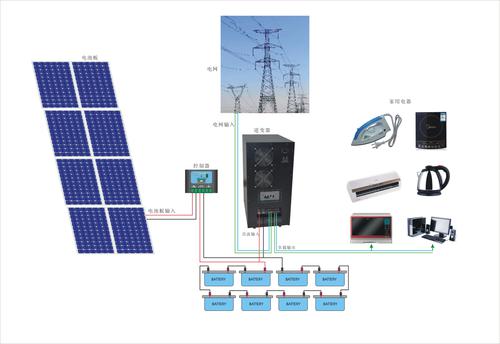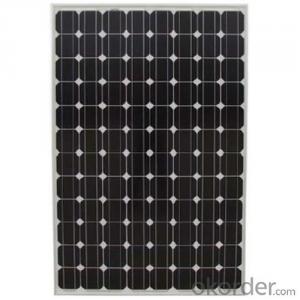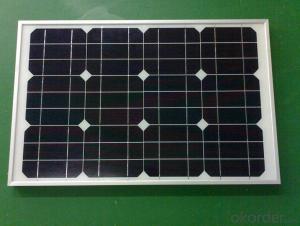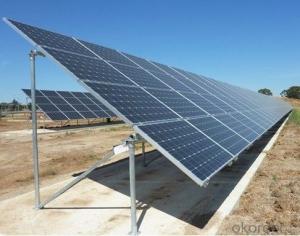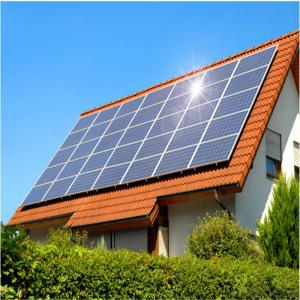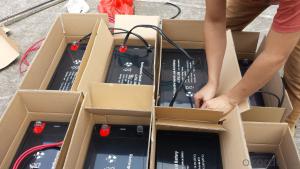Complete 24V 1000W solar panel systems
- Loading Port:
- Guangzhou
- Payment Terms:
- TT OR LC
- Min Order Qty:
- -
- Supply Capability:
- 1000sets set/month
OKorder Service Pledge
OKorder Financial Service
You Might Also Like
Hot sale solar panel system for home use 1000W
Features
Solar cell modules
It converts solar energy into electrical energy and the frames support solar panels.
Charge controller
It supplies direct current regulated from solar modules to the battery or inverter.
Stand-Alone Inverter
It supplies alternative current to loads after rectifying the direct current.
Battery
It supplies the electric power to loads through inverter in case the electric power generated from solar modules is in short supply or at night.
Complete 24V/1000W stand alone solar systems
5×200w poly solar panels//1×24V/50A solar charge controller//1×48V/3000W pure sine wave
inverter//4×12V/200Ah lead acid batteries//ground mounting brackets//50m PV cables for solar
panels connection//dual connectors for solar panels connection//connection cables for batteries.
average produce 6kwh power each day!!!
| 12V/200W Poly-crystalline Solar Panels | ||||||||
| Model: 200P Maximum power:200W Maximum power voltage:35V Maximum power current:5.71A Open circuit voltage:42.48V Short circuit current:6.29A Dimension:1350mm×1000mm×45mm Weight: 17.5kg Solar cells:48pieces(6×8)poly solar cells156mm×156mm;Grade A; CE certification Maximum systems voltage: 1000V | 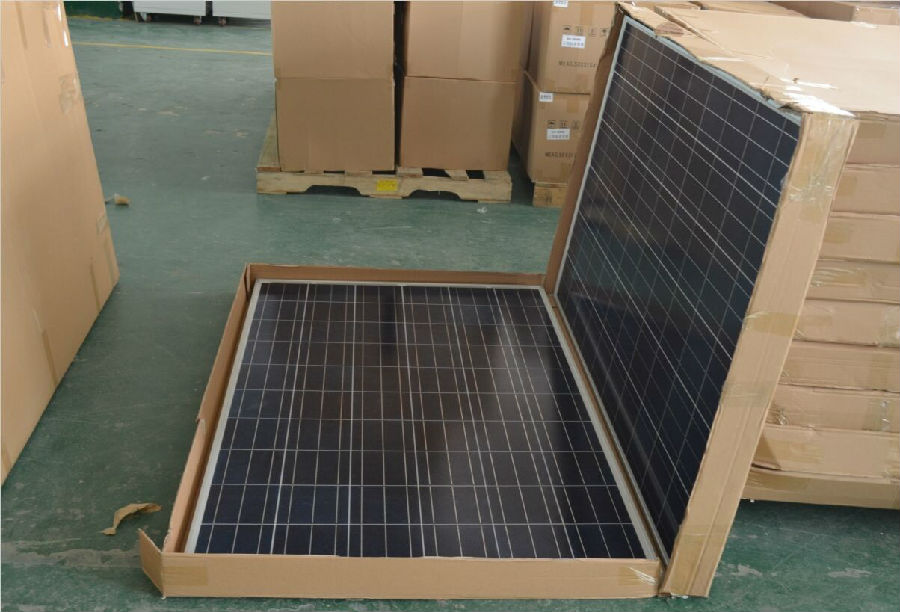 | |||||||
Wiring of solar panels: 1 panels in series, 5 strings in parallel | ||||||||
| 24V/50A solar charge controller | ||||||||
| Model:KF2450 Rated voltage: 24V Rated current: 50A Over-voltage protection 34V Over-discharge recover voltage: 25V working temperature: -20℃~45℃ Dimension: 184mm×110mm×57mm Weight: 0.66kg Features: battery switch | 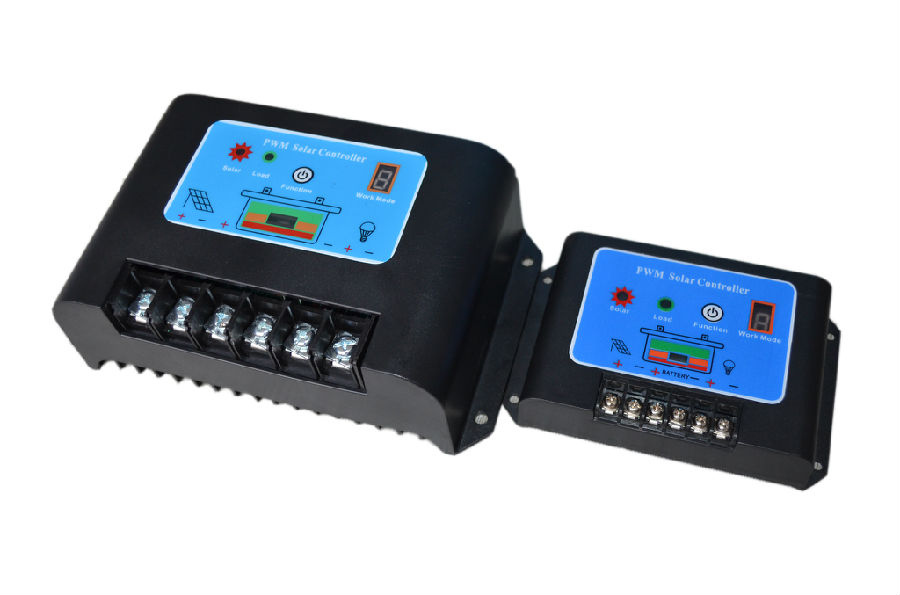 | |||||||
| Wiring of solar charge controller: firstly connect solar charge controller with battery bank, then connect solar charge controller with solar panels array, at last connect solar charge controller with loads or pure sine wave inverter | ||||||||
| 48V/3000W Pure Sine Wave Inverter | ||||||||
| Model:XD-NB10224 Rated input voltage:DC24V Input voltage range:75V~125V OR 145V~275V Output voltage:AC210V~AC240V Rated output power:1000W Maximum output power:2000W Output wave form: pure sine wave Dimension:396mm×190mm×240mm Weight:14kg. Working temperature: 0℃~40℃. Battery low voltage shutdown: DC21V | 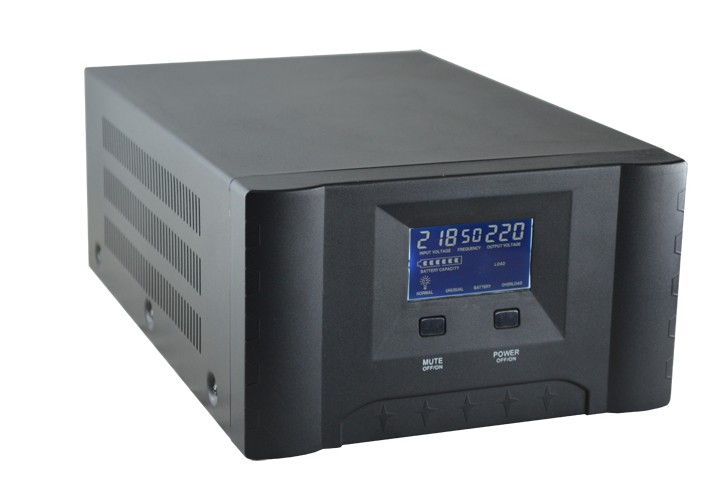 | |||||||
| 12V/200Ah deep cycle battery | ||||||||
| Deep cycle batteries in our stand alone solar systems have 2000 time charging-discharging cycle at 50% DOD. Gel batteries have better performance than lead acid batteries under cold temperature. besides, these battery are free-maintenance. |
| Package&shipment terms | |||||||||
| 1,We would pack all components into one plywood case and put much foam inside of plywood case, this packing way can make all components stand long distance transportation. 2,Because batteries are a kind of very heavy components and can't be allowed to transport by air, we have to choose sea transportation. though sea transportation would take more days to arrive, however you can save much postage. 3.We would ship the system to any bigger port near to customers, customers need to go to the port and pick up the system. |
More pictures about the solar panel system:
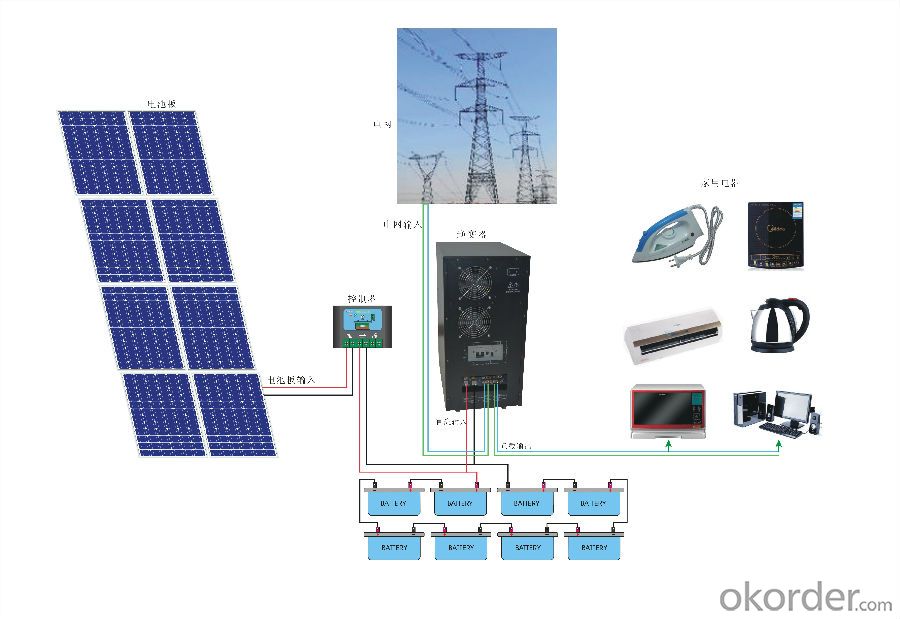
- Q: Can a solar energy system be installed in areas with high winds?
- Indeed, areas with high winds are suitable for the installation of solar energy systems. Nevertheless, it is essential to give due consideration to the wind load and tailor the system design accordingly. While solar panels are engineered to endure diverse weather circumstances, including powerful winds, it is imperative that they are mounted and fastened properly to ensure stability. Moreover, the utilization of aerodynamic mounting systems and tilt mechanisms can contribute to diminishing the influence of high winds on the solar panels. To ensure the system's resilience and efficiency, it is advisable to seek guidance from a professional installer who can evaluate the specific wind conditions in the vicinity and propose suitable solutions.
- Q: How do solar energy systems connect to the electrical grid?
- Solar energy systems connect to the electrical grid through a process called net metering, where excess electricity generated by the solar panels is sent to the grid and credited to the owner's account. When the solar panels produce less electricity than needed, electricity is drawn from the grid to meet the demand. This bidirectional flow is achieved through an inverter that converts the direct current (DC) electricity from the solar panels into alternating current (AC) electricity compatible with the grid.
- Q: Can solar energy systems be used in powering schools or educational institutions?
- Certainly, solar energy systems are a viable option for powering schools and educational institutions. By installing solar panels on the rooftops of these establishments, they can generate electricity that is both clean and renewable. This reduces their dependence on traditional fossil fuels, resulting in numerous advantages. Not only does it decrease greenhouse gas emissions and combat climate change, but it also leads to long-term cost savings on energy bills. Additionally, educational institutions have the opportunity to set an example for sustainable practices by employing solar energy and educating students about the significance of renewable power sources. Furthermore, solar power systems can be incorporated into the curriculum, allowing students to gain practical knowledge about solar energy and its real-world applications. All in all, integrating solar energy systems into schools and educational institutions presents a multitude of benefits, including environmental sustainability and educational opportunities.
- Q: What are the financial benefits of installing a solar energy system?
- The financial benefits of installing a solar energy system include reduced electricity bills as solar power generates free electricity from sunlight, potential savings on energy costs in the long run, decreased reliance on grid power and utility companies, potential eligibility for government incentives and tax credits, increased property value, and the possibility of selling excess energy back to the grid for additional income.
- Q: Are there any ongoing monitoring requirements for solar energy systems?
- Solar energy systems have ongoing monitoring requirements to ensure efficient and effective operation. Monitoring is crucial for identifying and addressing any potential issues or malfunctions promptly. Ongoing monitoring involves tracking various aspects of the system's performance, such as energy production, system uptime, and deviations from expected outputs. This can be accomplished using different monitoring tools and technologies, including real-time monitoring software, data loggers, or remote monitoring systems. Furthermore, specific monitoring requirements may exist in certain jurisdictions or incentive programs to ensure compliance with regulations or eligibility criteria. Regular monitoring is essential for maximizing the benefits of solar energy systems and ensuring their long-term performance and durability.
- Q: Can solar energy systems be used for powering electric vehicle car-sharing programs?
- Yes, solar energy systems can be used to power electric vehicle car-sharing programs. By harnessing the sun's energy, solar panels can generate electricity to charge the batteries of electric vehicles and support their operations in car-sharing programs. This renewable energy source aligns well with the sustainability goals of electric vehicles and can contribute to reducing the carbon footprint of transportation.
- Q: Can solar energy systems be used in areas prone to hurricanes or tornadoes?
- Yes, solar energy systems can be used in areas prone to hurricanes or tornadoes. However, it is essential to design and install them with specific considerations to withstand severe weather events. This can include using hurricane-rated solar panels, reinforced mounting structures, and proper anchoring techniques. Additionally, regular maintenance and inspection are crucial to ensure their resilience and performance in such high-risk areas.
- Q: What are the different financing options for solar energy systems?
- There are several financing options available for solar energy systems, including purchasing the system outright with cash, taking out a solar loan, leasing the system, or entering into a power purchase agreement (PPA). Each option has its own advantages and considerations, such as upfront costs, ownership of the system, maintenance responsibilities, and potential savings. It is important to research and compare these options to determine which one aligns best with your financial goals and circumstances.
- Q: Can solar energy systems be used for powering outdoor surveillance cameras?
- Certainly, outdoor surveillance cameras can be powered by solar energy systems. These systems are composed of solar panels that convert sunlight into electrical energy. This electricity can be utilized to operate various devices, including outdoor surveillance cameras. Sunlight captured by the solar panels, when installed near the cameras, is transformed into electrical energy that can be either stored in batteries or used directly to power the cameras. Consequently, there is no need for traditional power sources or the installation of electrical wires in remote locations. This solution is not only cost-effective but also environmentally friendly. Moreover, solar energy systems ensure a dependable and uninterrupted power supply, even in areas with limited access to electricity, thus guaranteeing continuous surveillance capabilities.
- Q: Are solar energy systems scalable for different energy needs?
- Yes, solar energy systems are scalable for different energy needs. They can be designed and configured to meet the energy requirements of various scales, from small residential installations to large commercial or industrial projects. By adding or removing solar panels and adjusting the system's capacity, solar energy can be effectively scaled up or down to accommodate different energy demands. Additionally, advancements in technology and improved efficiency of solar panels have made it easier to scale solar energy systems to meet larger energy needs effectively.
Send your message to us
Complete 24V 1000W solar panel systems
- Loading Port:
- Guangzhou
- Payment Terms:
- TT OR LC
- Min Order Qty:
- -
- Supply Capability:
- 1000sets set/month
OKorder Service Pledge
OKorder Financial Service
Similar products
Hot products
Hot Searches
Related keywords

